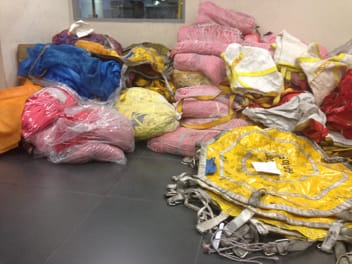A recent request by a member of ULD CARE for any information we might have on lost ULD triggered the idea of having an article on the subject in the newsletter as this is certainly a subject of interest to all our members.
Lost ULD has been an issue since ULD became part of air cargo and airline operations. Over the years there has been much talk about how some kind of technology solution such as RFID might solve this problem. Unfortunately over 40 years later, such solutions remain more theoretical than practical.
And while ULD CARE would very much like to be able to provide the industry with a solution, this too remains outside our capabilities.
 It seems every airline suffers some kind of ULD losses, with figures of up to 7% being talked of. Of course a great deal depends on the size and nature of the airline’s operations. There are some particularly high risk “zones” including full aircraft charters to a remote location where the pallets simply get left behind, loose cargo nets simply get taken off and thrown in the corner of the terminal and of course tie down straps which seem to get lost in vast quantities every year.
It seems every airline suffers some kind of ULD losses, with figures of up to 7% being talked of. Of course a great deal depends on the size and nature of the airline’s operations. There are some particularly high risk “zones” including full aircraft charters to a remote location where the pallets simply get left behind, loose cargo nets simply get taken off and thrown in the corner of the terminal and of course tie down straps which seem to get lost in vast quantities every year.
What can the industry do about this? While there not being any immediate technology solution on the horizon, the answer lies primarily in changing the culture of the people who carry out ULD operations on the ground. After all no ULD was ever lost inside a plane, and in this regard the efforts of both IATA and ULD CARE to broadcast the message of the importance of ULD are starting points. Once the industry at large wakes up to taking their share of the responsibility for ULD, we could expect a significant reduction in ULD losses.
With this expectation, given the particular interest of ULD CARE in keeping track of ULD and to raise the profile of this important subject, we will devote some time during the 2015 ULD CARE Annual Conference in Bangkok next September to the subject of lost ULD. In order to prepare for this properly we would like to request that all our airline members provide us with some information on their own losses through a confidential questionnaire which will be sent to them shortly. It is only by having a reasonably accurate “snapshot” of where we are now that we can progress to a better situation.
The issue of lost and stolen ULD can be taken in the context of the much larger lack of awareness of the value and importance of ULD and, in this regard, can be grounds for some optimism: the IATA ULD Regulations start to gain more and more recognition throughout the industry and of course the implementation of the revised ULD Control Receipt, designed to give better control of the transfer of ULD between parties other than airlines, should also work towards a better situation.
Over the years tens of thousands of ULD’s have been lost, adding up to many millions of dollars. This surely is not an acceptable situation in an industry that struggles with profitability. Some focus on this issue will certainly do no harm and, if ULD CARE can provide a properly researched snapshot of the problem, it can certainly help us move things forward.

Lost ULD or just mislaid?


